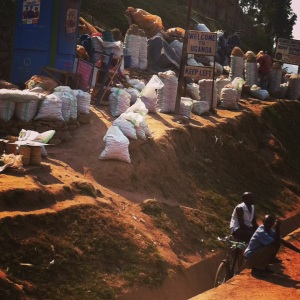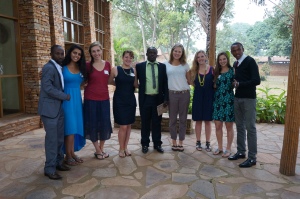Our journey to Kampala began with an early bus from Butare filled with Jim Dale’s voice reading us Harry Potter. We arrived a few hours early to the bus but thankfully discovered the most amazing spring rolls at a bus station bakery. When we finally arrived to the Backpacker’s Hostel we were greeted by the lovely Katy Stewart- an alumni to the GROW trip and our chapter’s former president. The next few days of exploring around Kampala felt like I had time traveled back to Delhi with all of the traffic, pollution, crowds, and energy. Natasha also ensured that we visited an Indian clothing shop and we all got our fair share of North Indian Thali. Maddie, Molly and I decided to brave the level 5 rapids on the Nile and survived two capsizes and a swim with some forest cobras. After three days of exploring Kampala, having American style pizza for the first time, spending all of our money at craft markets, and discovering Uganda’s specialty street food snack/meal, rollex (an omelet and chapatti rolled up and stuffed into a plastic bag), we were ready for some of our first GlobeMed conferences!
The East Africa Forum was a collection of GROW interns, partners, friends, alumni, foundations, and NGOs from almost all of the East African countries gathered together at the beautiful Ndere Center to discuss how we can “unite communities for sustainable action.” * We referred to it as Camp GlobeMed. We instantly made friends with all of the other members and the weekend began to feel more like a family reunion of people you had never met, rather than a conference. I met Mike on the bus ride back to Kampala and he ended up staying with us for two nights while he visited the Murambi Memorial and Nyuguye National Park. Our roommates were surprised that we had never met him before.
The main takeaway we learned from the conference was how to seek partnerships, whether between NGOs such as Resilient Africa Network and local universities that create innovations to better the lives of local communities, partners and GROW teams, parnters and other NGOs, partners and fundraising groups**, partners/ GROW teams and mentors, or GROW teams and GROW teams. We had the chance to talk to all of the other interns some of whom had only been in Africa for a few days or others who were heading home at the end of the weekend. We shared our successes and frustrations and it made us feel more productive about the work that we have been doing and appreciative towards our relationship with RVCP. We realized that despite our frustrations, we have been given the opportunity to do real hands-on work in improving the MHEP program and RVCP’s capacity. The conference also reminded us how much we love Butare and Rwandan dancing.
The lectures and panels we attended emphasized the importance of efficiency and community-based development within partnerships. We were also reminded of the value of accountability and clear visions when working with media or fundraising, both of which we hope to improve in our last two weeks in Rwanda.
The most inspirational lecture we attended was facilitated by Pam, a member of Columbia University’s partner organization. She drove home the importance of having, seeking, and asking for mentorship in any field that you are working in. She explained that one partner mentioned that their interns asked so many questions (this hit close to home since RVCP is probably sick of all of the questions that we ask them during our meetings). She responded that asking questions is healthy; we were probably just asking questions that they did not have time to ask themselves; and it was not because we did not understand what was going on, but we wanted confirmation for how the programs worked. Mentorships, she explained, served as a symbiotic relationship where both parties were learning from each other, by sharing beneficiaries and resources, and allowing organizations to see the results of transformation. She stressed that you had to seek mentorship and ask for help when you needed it. Pam responded to concerns of students that the potential mentors might not have time, which she reassured that you must be persistent when asking and if they really did not have time, the relationship would not benefit anyone.
In case anyone was wondering how they could be a good mentor, according to Pam, they must clarify clear goals, outsource to help fill gaps, create open space for discussion, understand the nature of the relationship, listen, help identify problems and solutions, explore needs and motivations, provide constructive feedback, serve as a role model, help the mentee to ask valuable questions, be accountable and honest (and on time), and above all- seek growth. Finally, she explained that with “relationships, trust, kept promises, integrity and confidence building…anything can happen within given resources.”
On Saturday morning, Alyssa introduced us with the questions “Who am I? What can I do? With Whom? And With What Resources?” and concluded that energy, art, culture, and music were sometimes the best methods for uniting communities and in this way we can stay alive. Based on the number of times we have been asked to sing for our RVCP groups or pulled into dance circles, our team could definitely relate to her final words. We have constantly had to question our group’s and our personal capacities over the summer, but I think all five of us could say that we have learned more about our selves, our capabilities, and our mentors and resources, while maintaining our personal values and appreciating those of the partners we have been working with.
Love,
Hannah
*In case you were confused by any of our terminology, GlobeMed is the national organization that we are chapter members of in the United States and who organizes our partnerships across the world. The GROW internship is the Grass-Roots- Onsite Work project that the five of us are participating in the summer. The partners are the organizations that we are working with both in Africa and at home, ours is the Rwandan Village Concept Project (RVCP). Alyssa is an alumni of GW, GW GlobeMed, and the 2011 GROW team, she is currently working for the National Office as the Director of Partnerships and coordinated most of this conference.
**If you are seeking a resource for international donations, seedgrants will be launched in a few months. It is a crowd -funding platform (similar to globalgiving) to support innovations through the use of grants, instead of loans. If you have any questions, contact Steven Grant at sgrant@ghets.org.



